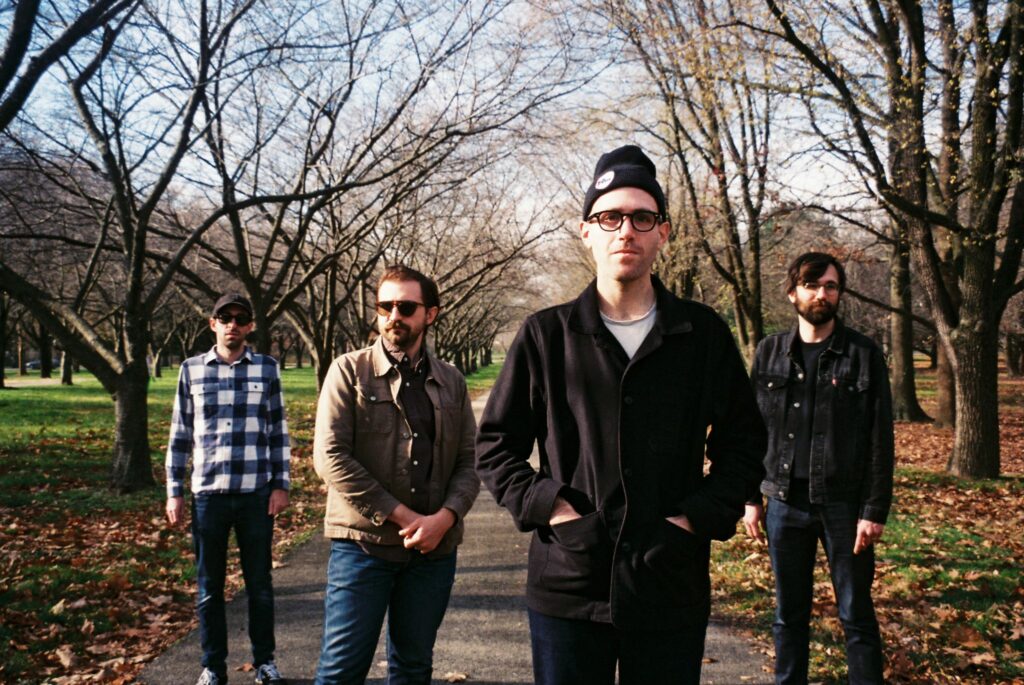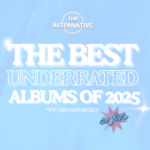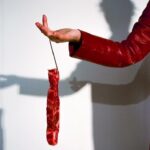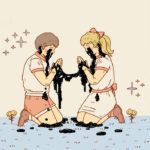Interview: Hurry on “Fake Ideas” and Subtle Evolution
Posted: by The Alt Editing Staff

Photo by Megan Wilson
On their fourth album Fake Ideas, Hurry makes a subtle evolution. While the record fits in neatly with its predecessors—the infectious power-pop of 2016’s Guided Meditation and their detailed and meticulously crafted 2018 follow-up Every Little Thought—Matt Scottoline’s latest record as Hurry feels a little warmer, a little more loose than what came before. Scottoline is still making breezy indie pop, but Fake Ideas feels a little more open to new possibilities, experiments with 90-second punk songs (“Doomsday”) or recasting an old favorite in a new role (“Oh Whitney”).
Loosening up this time, Scottoline says, was more difficult than it might sound. “I felt like I was trying some new stuff and I wasn’t getting 100 percent psyched about anything.” He ended up writing 30 new songs before completely starting over. “I think what I ultimately realized is that sometimes understanding what you’re capable of and trusting that is almost more of an evolution than just trying to do something different,” he said.
Thematically, Fake Ideas is mostly concerned with this effort of getting out of one’s own head. “Everything I think about myself was just created by my mind and twisted over time,” Scottoline sings on “A Fake Idea.” So it makes sense that the main concern of the album’s companion zine Fake Ideas Vol. 1 is a mostly external-facing affair. In the book, Scottoline interviews each person who contributed to the record. “It’s really just me wanting to highlight all these people, and also put faces to names and show gratitude to them in that way.” This creative spark to try something new while also celebrating everything that makes the band what it is feels perfectly in line with the spirit of the record.
A few weeks ago I spoke to Scottoline about Fake Ideas, the zine, and the state of the independent music community in the wake of the pandemic. You can read that conversation below, and make sure to check out Fake Ideas while you’re at it.
So tell me a little bit about the new record.
Matt Scottoline: The new record is called Fake Ideas. We started recording it in November of 2019 and kept working on it…I was probably in the studio on and off for the next three months. I think we finished it around mid-to-late February of 2020. And then I didn’t get the masters back until the pandemic had already sort of kicked in. So it’s been a while since I made it.
How do you feel about Fake Ideas as it fits into the continuum of Hurry records?
I think for me it’s always hard…I joke that an artist always thinks that their newest thing is so different or so out there and then everybody else thinks it just sounds the same. I do think my approach to this record was different in a lot of ways. Definitely from a songwriting standpoint. I think in the past, there’d always be B-sides and things that didn’t make the cut. For a 10-song record I would maybe write 15 songs and then decide which ones I don’t think should make the cut. With this record, I probably wrote around 30 songs before I actually wrote any of the songs that were on the record. I felt like I was trying some new stuff and I wasn’t getting 100 percent psyched about anything. And then one day, I wrote that 30th song and I was like “oh man, this is what I’ve been trying to do—I kind of understand the direction of this thing now.”
So I sort of started over at that point and that’s when I got the songs on the record. This was the first record where I didn’t really go in with some specific tonal theme in mind as far as how the instruments would sound. The first record I made, I was really set on it being loud and fuzzy and crazy. I had this artistic vision of like, it’s gonna be pop music, but it’s gonna sound all crazy. After that, the next record Guided Meditation, I decided I was gonna do the exact opposite as a challenge and I decided to make a really clean, pretty record, using no distortion at all on the entire record. That was really fun. Following that up with Every Little Thought, I kind of was like, I’m gonna stay in this and try to perfect this version of my sound that I stumbled into. I kind of maxed that out a little bit, so this time I just really wanted it to be a little more pure and a little less calculated. We recorded to tapes this time, which we hadn’t done before. You know, it just wasn’t as meticulous, I just kind of wanted to let the songs sort of shine through and not necessarily the aesthetics. It was almost harder letting go of that idea. We all get so stuck in our ways, whatever they are and whatever we do, that sometimes the biggest challenge can be to just not do those things.
Was the 30th song that you wrote on the record?
It is—if you challenge me to tell you which one, I don’t know if I could. I want to say it’s “Where You Go, I Go” but it was something in that vein. I don’t know, I think it was a simpler song and “Where You Go, I Go” is a pretty straightforward, open song and to me it kind of gets at the core of what I think I’m good at. That’s the realization I had. I think I was feeling a lot of pressure to evolve my sound and I was trying all kinds of things that weren’t really in my wheelhouse or weren’t really things that I usually do. I was writing songs and there were cool parts but it just didn’t feel right. So I think what I ultimately realized is that sometimes understanding what you’re capable of and trusting that is almost more of an evolution than just trying to do something different. I do feel like this album is an evolution, just not in the way that I planned for, sort of counterintuitively.
I’m sure you feel that way too as someone who writes. I can’t totally speak for you but I think any creative person has been in that situation where you’re like “I’m gonna do better, I’m gonna try this thing,” and then you try it and it doesn’t even feel right and you’re not even that psyched about it. You sort of start to understand who you are and be comfortable with that and that’s when you really sort of push what you’re good at forward.
Yeah absolutely. And in my experience, it’s about a very frustrating kind of patience. You want to do the big, different thing, but really what you need to do is sit and do what you do over and over again, just slightly better every time.
Yeah, and it’s hard. In any creative world, I think everybody feels that pressure to one-up themselves. But I think it’s easy to sort of lose yourself in that a little bit.
You recently released “A Fake Idea,” which is the (almost) title track of the record. Can you tell me a little about your headspace when writing that song and how it relates to the record as a whole?
I do think that song is a pseudo-title track for a reason. I think that the last three records especially are pretty reflective of my personal life and my own mental health. It’s been a journey—on Guided Meditation, a lot of the music on there is me starting to struggle with anxiety. I called it Guided Meditation because I got so into meditation for years. I was like, “this is going to solve all my problems.” I was struggling and I didn’t fully get it. Every Little Thought is sort of like the pit of that—a lot of the themes on that record are sort of about feeling anxiety and there’s a lot of stuff about not understanding completely why things are wrong and why you go through what you go through. Over the years I’ve done a lot of therapy and thematically on this record—and I think “A Fake Idea” is almost the most literal explanation of this—it’s sort of about me coming to realize that a lot of the problems I have or a lot of the things in my life that I think could be better are actually caused by me and caused by my mental health and being in the place I’m in. That song and the album as a whole are a lot about coming to grips with like, oh my god, it’s so obvious now but I had no idea that everything I thought was true and all these thoughts I had and the way I saw my life and the world and all of it was just completely manufactured by mental illness. But it feels so real when you’re in it. Someone who’s anxious or someone who’s depressed, you can’t see that that’s the case. You just think, I’m in that reality. This is what it is.
I think that’s an interesting contrast to the way a lot of the songs sound. Most of them are kind of breezy, power-pop tracks that sound immediate, but there’s a whole lot of tension when you get down to the lyrics.
It comes naturally to me. That’s the music I grew up with. Even when I was super young and I was listening to the Beach Boys or something. Just listening to a song like “Surfer Girl,” which is a classic Beach Boys song. That song has some of the best melodies ever written, it’s immediately stuck in your head, but it has this crazy melancholy vibe to it. And it makes you want to cry when you listen to it. I think that dichotomy, it kind of naturally flows into how my tastes have evolved. I started out by listening to ‘90s alt rock or whatever but even getting into listening to emo music and stuff—I think there’s a lot of, especially that early ‘00s emo, The Get Up Kids or Juliana Theory or Pedro the Lion, all that stuff kinda does a version of that. To me that’s a tenant…I know there’s some emo music that’s just straight-up sad all the time and everything feels sad or whatever. But I was never quite as drawn to that, I was always drawn to the stuff that had a little more energy and the vibe of it felt uplifting even if lyrically it was going to different places. Also it’s just how I write songs. I know there are some songs that I’ve written that are just straight-up classic love songs and the vibes are good, but I’ve always liked music that had a sense of longing. That’s usually what grabs me the most.
A lot of your music, while not exactly throwback-y, has a nostalgic element to it. There’s one song in particular on Fake Ideas called “Slogging Through the Summer” that’s written from a younger person’s perspective. Do you think of nostalgia as being an important part of what you do?
I don’t know, not consciously. I know when I write a song like that, it’s coming from lived experiences, but it’s not a literal thing that happened to me yesterday. I mean, I have nostalgia for music that sounds that way. And then there is a part of me that likes to play with nostalgia. I also listen to music and sometimes I hear something new that feels nostalgic to me, even though I haven’t heard it before and I don’t have a reason to feel nostalgia for it. I feel that way a lot of the time about songs from Teenage Fanclub. Especially songs written by Gerard Love, there’s just this crazy wistful nostalgic thing that I get from those songs and I think it speaks to me because I just have the same bug in me.
At the other end of the spectrum, I wanted to ask about “Doomsday.” That one sounds closer to those early ‘00s emo bands you mentioned like The Get Up Kids. How did it feel to dabble back in that style a little bit?
It was fun. It was part of that exercise I was talking about earlier and letting go of overthinking and over-conceptualizing. I wrote that song one day, not as a goof but I was just like, “I’m gonna do something a little different.” And in my trying to let go and not overthink things I was just like whatever, let’s put the song on the record. It’s like a 90-second punk song, and I’m gonna throw it in as track 4 and we’ll see what people have to say about that. There is something exciting to me about subverting expectations. I do think this record, more than any of the other ones, is successful in doing that.
You also re-recorded the song “Oh Whitney” for this record—what was the idea behind that?
It’s just something I always wanted to do. When you write a song or record a song, you never anticipate that you’re going to be playing that song for years and years. “Oh Whitney,” I did on the first record and, like I kinda said earlier, it was really fuzzy and it sounds completely insane. Which I think is cool, but that song became a song people liked and it became a song that we—I think we’ve played it at every show that we’ve played since that record came out. It’s a song that we’re known for, but I always got kind of bugged that the recording sounded how it sounded just because I kind of felt like in a way it was selling the song short. I toyed around with the idea for a long time and again, in an exercise of being just like “screw it, let’s do what we want to do,” I just decided to put it on this record.
Let’s talk about the book that you put together, Fake Ideas Vol. 1. Why did you decide to have that companion piece to the record?
Part of it comes from the pandemic and the delay of this record and me feeling a little bit creatively stifled and wanting something to work on. I didn’t want to get too far ahead of myself writing a lot of new music before this album even came out. I was toying around to try and figure out what I could do, and I got this idea in my head of doing conversations and writing them out and publishing them somehow. There have been some art zines over the years that I was really into. There was one that was called Woo Magazine and this guy in New York would interview a really broad range of famous people in a really kind of crazy conversational way. It was almost like he called them without any warning and just talked to them for five minutes. I always thought that was so cool. So I was thinking about doing something like that and trying to figure out, why am I doing this? You get into that normal thing that everyone gets into where you’re like “why am I writing anything? Who cares? Why should I do this?” There’s this experimental journalist named AJ Jacobs that I like to read, and he had a new book that came out in the last two years and I just kind of got to it over the pandemic. The concept of this book was that he wanted to thank every person who makes his daily coffee possible. So he was thanking the baristas and the coffee roasters but then he was thanking the people who make the little cardboard sleeves that go on the cup and the people who warehouse the coffee. He thanked like a thousand people in it.
Around that same time, I think there was some discourse online from some people in the industry I follow that was about credits on records in the age of streaming and the fact that, unless you buy a physical copy of something and dig into the liner notes, there’s no way to know who worked on things and they’re not really getting credited anywhere and it’s really a shame because they’re all such integral parts of these records. So it all kind of mushed together in my head around then and I was like oh cool, I can do this thing I’ve been thinking about and I have a concept for it and I can tie it in with the record. That’s kind of how it happened, I just called everybody up who was involved in any way, I even reached out to AJ Jacobs and he submitted a little blurb for me which was really nice. And that’s how it came together—it’s really just me wanting to not only highlight all these people, and almost put faces to names in a certain way and give personality to all these contributors and show gratitude to them in that way, but also help people who are engaging with the record with a more in-depth foundation to approach the whole thing from.
I tend to think of Hurry as a very Philly institution—I’m curious if there are any bands or anything happening in the city that you’re especially excited about right now.
Band-wise, I just feel so unplugged because there haven’t been any shows and I feel like I just always find out about stuff by going to a show or playing a show with bands I don’t know yet. I think Harmony Woods is awesome and I think every day more and more people are realizing that. I think the new Spirit of the Beehive record is insane. And I think Slaughter Beach, Dog, his record At The Moonbase I thought was one of the best things he’s ever done. As far as the city as a whole I don’t know—to be honest with you, I’m feeling really pessimistic these days. Just because of the way the pandemic has affected things. I mean, Boot and Saddle closed, which was such an important place, and I can’t name a single all-ages DIY venue. The last show we played was the closing of Everybody Hits. To me, it’s a little scary, coming out of this thing, whenever that actually happens, it’s gonna be weird to see what is even there, or where people can play or where less-established bands will have the access to perform. It’s kind of a sad answer, but it’s something I’ve been thinking about. The pandemic and the industry right now coming out of the pandemic is not a DIY-friendly situation.
You may not have an answer for this, but do you have an idea of what a way forward might look like?
There’s a part of me that’s really pessimistic and I’m like, I don’t know what’s gonna happen, I’m not feeling confident, I’m feeling kind of doom and gloom. But we just had the first meeting of the Philly chapter of the musician’s union that started during the last year. I think there were like 20 of us at the meeting, and one of the things that came up was this idea of access and the way that the city, if you’re a smaller band or a newer band, we’re running out of places for you to exist. Especially all-ages places. So what gives me some hope is this idea of organization. Just the community looking out for each other and hopefully using the power of the community to create those spaces or help spaces become those spaces. I think there’s a lot of opportunity there, and I think this union and things like that are promising in a time where my assessment of what’s happening right now is that the pandemic is actually going to give more power to the more establishment elements of the music industry.
One example would be looking at all the shows that are booked right now anywhere in the country—Philadelphia, New York, LA, wherever you’re looking—every show that’s booked right now is at a major venue and it’s a tour done by a big agency with bands that are on big labels. Because that’s the only thing that can survive right now. My point is that I get scared because I see what’s happening and it does make me fearful that DIY bands or more independent bands or people who are just trying to start bands, I get worried that they’re not gonna have a place to go. The same way that during the pandemic, all the billionaires became richer. I think there is this inherent thing that when the systems all get shut down, it creates an opportunity for the people in power to benefit. I worry that’s what’s gonna happen but I’m hopeful that the artists can band together and these unions can really gain membership and gain power and gain influence, that there’s gonna be ways to sort of combat that and make it better.
Hurry’s new record Fake Ideas is available on Lame-O Records.
–
Jordan Walsh | @jordalsh
The Alternative is ad-free and 100% supported by our readers. If you’d like to help us produce more content and promote more great new music, please consider donating to our Patreon page, which also allows you to receive sweet perks like free albums and The Alternative merch.










